Organisational Behaviour at Sainsbury's: Culture, Power, and Theories
VerifiedAdded on 2023/06/18
|19
|4995
|410
Report
AI Summary
This report provides an analysis of organisational behaviour within Sainsbury's, focusing on how culture, politics, and power influence individual and team performance. It examines the application of Handy's cultural model and explores the impact of different types of organisational power, such as legitimate, reward, and coercive power. The report also assesses the role of business politics and its negative effects on employee motivation and productivity. Furthermore, it discusses the implementation of process and content theories, including Maslow's Hierarchy of Needs, to enhance employee engagement and achieve organisational goals. The effectiveness of teams is evaluated, contrasting effective and ineffective team dynamics, and the application of various organisational behaviour philosophies is explored within the Sainsbury's context.
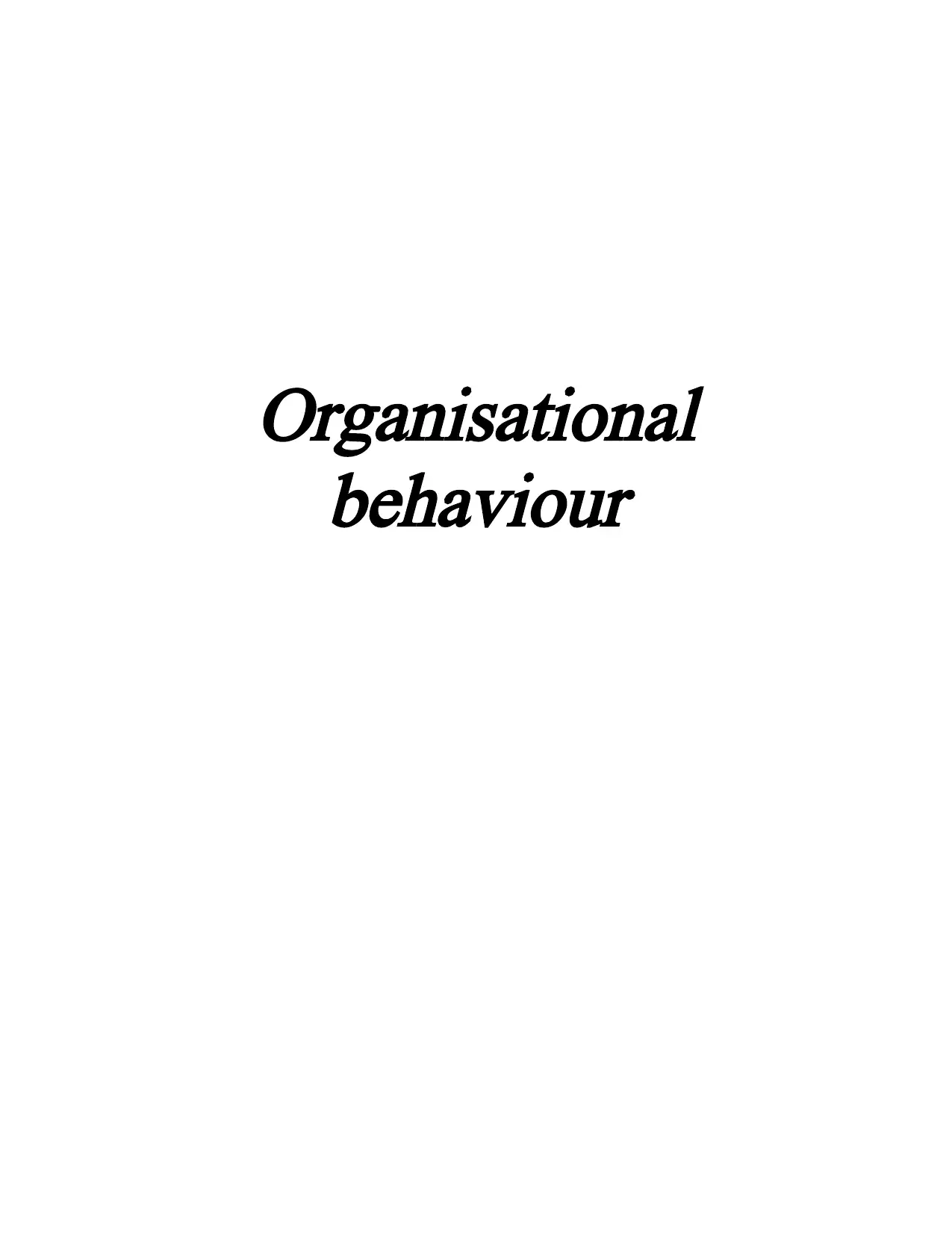
Organisational
behaviour
behaviour
Paraphrase This Document
Need a fresh take? Get an instant paraphrase of this document with our AI Paraphraser
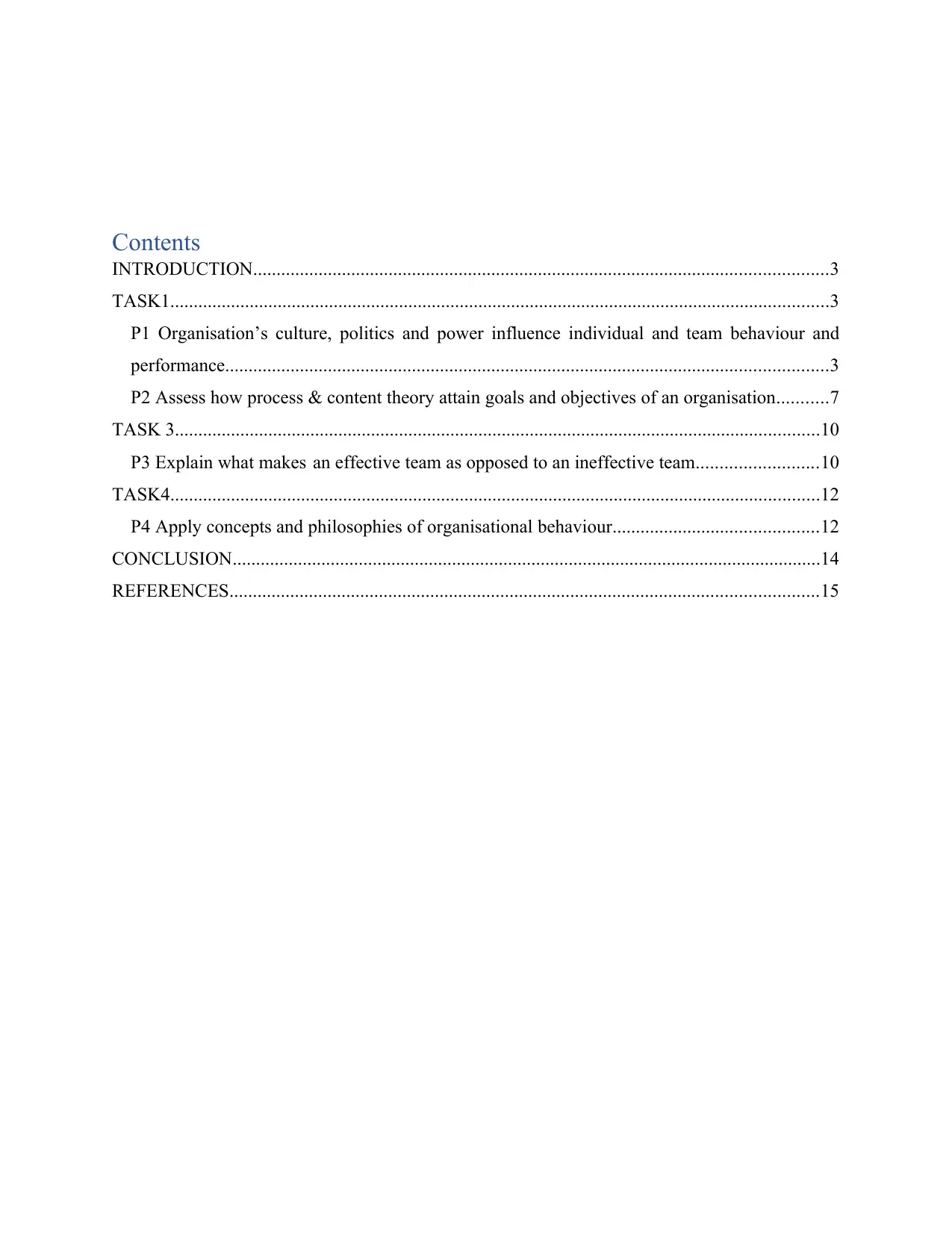
Contents
INTRODUCTION...........................................................................................................................3
TASK1.............................................................................................................................................3
P1 Organisation’s culture, politics and power influence individual and team behaviour and
performance.................................................................................................................................3
P2 Assess how process & content theory attain goals and objectives of an organisation...........7
TASK 3..........................................................................................................................................10
P3 Explain what makes an effective team as opposed to an ineffective team..........................10
TASK4...........................................................................................................................................12
P4 Apply concepts and philosophies of organisational behaviour............................................12
CONCLUSION..............................................................................................................................14
REFERENCES..............................................................................................................................15
INTRODUCTION...........................................................................................................................3
TASK1.............................................................................................................................................3
P1 Organisation’s culture, politics and power influence individual and team behaviour and
performance.................................................................................................................................3
P2 Assess how process & content theory attain goals and objectives of an organisation...........7
TASK 3..........................................................................................................................................10
P3 Explain what makes an effective team as opposed to an ineffective team..........................10
TASK4...........................................................................................................................................12
P4 Apply concepts and philosophies of organisational behaviour............................................12
CONCLUSION..............................................................................................................................14
REFERENCES..............................................................................................................................15
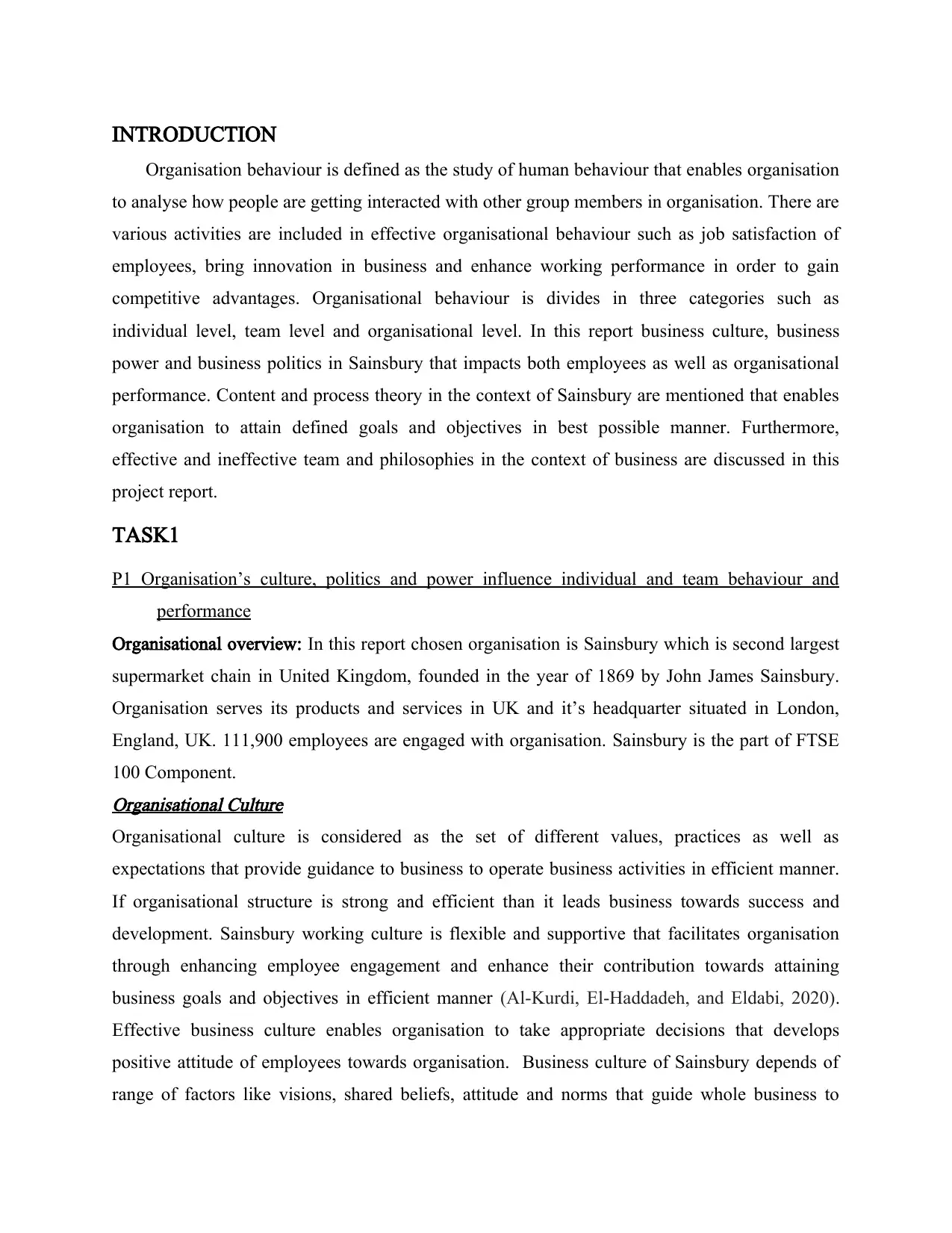
INTRODUCTION
Organisation behaviour is defined as the study of human behaviour that enables organisation
to analyse how people are getting interacted with other group members in organisation. There are
various activities are included in effective organisational behaviour such as job satisfaction of
employees, bring innovation in business and enhance working performance in order to gain
competitive advantages. Organisational behaviour is divides in three categories such as
individual level, team level and organisational level. In this report business culture, business
power and business politics in Sainsbury that impacts both employees as well as organisational
performance. Content and process theory in the context of Sainsbury are mentioned that enables
organisation to attain defined goals and objectives in best possible manner. Furthermore,
effective and ineffective team and philosophies in the context of business are discussed in this
project report.
TASK1
P1 Organisation’s culture, politics and power influence individual and team behaviour and
performance
Organisational overview: In this report chosen organisation is Sainsbury which is second largest
supermarket chain in United Kingdom, founded in the year of 1869 by John James Sainsbury.
Organisation serves its products and services in UK and it’s headquarter situated in London,
England, UK. 111,900 employees are engaged with organisation. Sainsbury is the part of FTSE
100 Component.Organisational Culture
Organisational culture is considered as the set of different values, practices as well as
expectations that provide guidance to business to operate business activities in efficient manner.
If organisational structure is strong and efficient than it leads business towards success and
development. Sainsbury working culture is flexible and supportive that facilitates organisation
through enhancing employee engagement and enhance their contribution towards attaining
business goals and objectives in efficient manner (Al-Kurdi, El-Haddadeh, and Eldabi, 2020).
Effective business culture enables organisation to take appropriate decisions that develops
positive attitude of employees towards organisation. Business culture of Sainsbury depends of
range of factors like visions, shared beliefs, attitude and norms that guide whole business to
Organisation behaviour is defined as the study of human behaviour that enables organisation
to analyse how people are getting interacted with other group members in organisation. There are
various activities are included in effective organisational behaviour such as job satisfaction of
employees, bring innovation in business and enhance working performance in order to gain
competitive advantages. Organisational behaviour is divides in three categories such as
individual level, team level and organisational level. In this report business culture, business
power and business politics in Sainsbury that impacts both employees as well as organisational
performance. Content and process theory in the context of Sainsbury are mentioned that enables
organisation to attain defined goals and objectives in best possible manner. Furthermore,
effective and ineffective team and philosophies in the context of business are discussed in this
project report.
TASK1
P1 Organisation’s culture, politics and power influence individual and team behaviour and
performance
Organisational overview: In this report chosen organisation is Sainsbury which is second largest
supermarket chain in United Kingdom, founded in the year of 1869 by John James Sainsbury.
Organisation serves its products and services in UK and it’s headquarter situated in London,
England, UK. 111,900 employees are engaged with organisation. Sainsbury is the part of FTSE
100 Component.Organisational Culture
Organisational culture is considered as the set of different values, practices as well as
expectations that provide guidance to business to operate business activities in efficient manner.
If organisational structure is strong and efficient than it leads business towards success and
development. Sainsbury working culture is flexible and supportive that facilitates organisation
through enhancing employee engagement and enhance their contribution towards attaining
business goals and objectives in efficient manner (Al-Kurdi, El-Haddadeh, and Eldabi, 2020).
Effective business culture enables organisation to take appropriate decisions that develops
positive attitude of employees towards organisation. Business culture of Sainsbury depends of
range of factors like visions, shared beliefs, attitude and norms that guide whole business to
⊘ This is a preview!⊘
Do you want full access?
Subscribe today to unlock all pages.

Trusted by 1+ million students worldwide
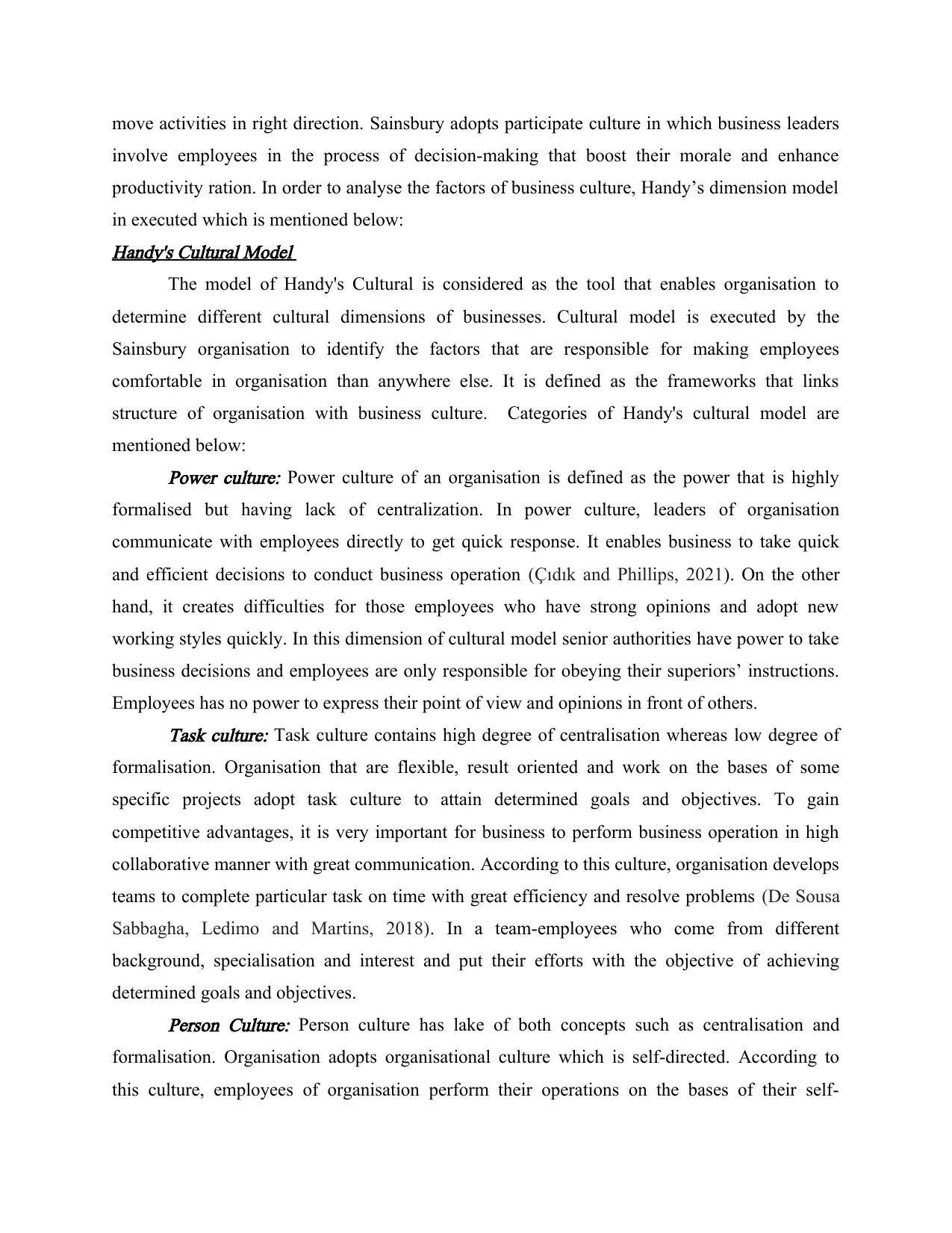
move activities in right direction. Sainsbury adopts participate culture in which business leaders
involve employees in the process of decision-making that boost their morale and enhance
productivity ration. In order to analyse the factors of business culture, Handy’s dimension model
in executed which is mentioned below:Handy's Cultural Model
The model of Handy's Cultural is considered as the tool that enables organisation to
determine different cultural dimensions of businesses. Cultural model is executed by the
Sainsbury organisation to identify the factors that are responsible for making employees
comfortable in organisation than anywhere else. It is defined as the frameworks that links
structure of organisation with business culture. Categories of Handy's cultural model are
mentioned below:
Power culture: Power culture of an organisation is defined as the power that is highly
formalised but having lack of centralization. In power culture, leaders of organisation
communicate with employees directly to get quick response. It enables business to take quick
and efficient decisions to conduct business operation (Çıdık and Phillips, 2021). On the other
hand, it creates difficulties for those employees who have strong opinions and adopt new
working styles quickly. In this dimension of cultural model senior authorities have power to take
business decisions and employees are only responsible for obeying their superiors’ instructions.
Employees has no power to express their point of view and opinions in front of others.
Task culture: Task culture contains high degree of centralisation whereas low degree of
formalisation. Organisation that are flexible, result oriented and work on the bases of some
specific projects adopt task culture to attain determined goals and objectives. To gain
competitive advantages, it is very important for business to perform business operation in high
collaborative manner with great communication. According to this culture, organisation develops
teams to complete particular task on time with great efficiency and resolve problems (De Sousa
Sabbagha, Ledimo and Martins, 2018). In a team-employees who come from different
background, specialisation and interest and put their efforts with the objective of achieving
determined goals and objectives.
Person Culture: Person culture has lake of both concepts such as centralisation and
formalisation. Organisation adopts organisational culture which is self-directed. According to
this culture, employees of organisation perform their operations on the bases of their self-
involve employees in the process of decision-making that boost their morale and enhance
productivity ration. In order to analyse the factors of business culture, Handy’s dimension model
in executed which is mentioned below:Handy's Cultural Model
The model of Handy's Cultural is considered as the tool that enables organisation to
determine different cultural dimensions of businesses. Cultural model is executed by the
Sainsbury organisation to identify the factors that are responsible for making employees
comfortable in organisation than anywhere else. It is defined as the frameworks that links
structure of organisation with business culture. Categories of Handy's cultural model are
mentioned below:
Power culture: Power culture of an organisation is defined as the power that is highly
formalised but having lack of centralization. In power culture, leaders of organisation
communicate with employees directly to get quick response. It enables business to take quick
and efficient decisions to conduct business operation (Çıdık and Phillips, 2021). On the other
hand, it creates difficulties for those employees who have strong opinions and adopt new
working styles quickly. In this dimension of cultural model senior authorities have power to take
business decisions and employees are only responsible for obeying their superiors’ instructions.
Employees has no power to express their point of view and opinions in front of others.
Task culture: Task culture contains high degree of centralisation whereas low degree of
formalisation. Organisation that are flexible, result oriented and work on the bases of some
specific projects adopt task culture to attain determined goals and objectives. To gain
competitive advantages, it is very important for business to perform business operation in high
collaborative manner with great communication. According to this culture, organisation develops
teams to complete particular task on time with great efficiency and resolve problems (De Sousa
Sabbagha, Ledimo and Martins, 2018). In a team-employees who come from different
background, specialisation and interest and put their efforts with the objective of achieving
determined goals and objectives.
Person Culture: Person culture has lake of both concepts such as centralisation and
formalisation. Organisation adopts organisational culture which is self-directed. According to
this culture, employees of organisation perform their operations on the bases of their self-
Paraphrase This Document
Need a fresh take? Get an instant paraphrase of this document with our AI Paraphraser
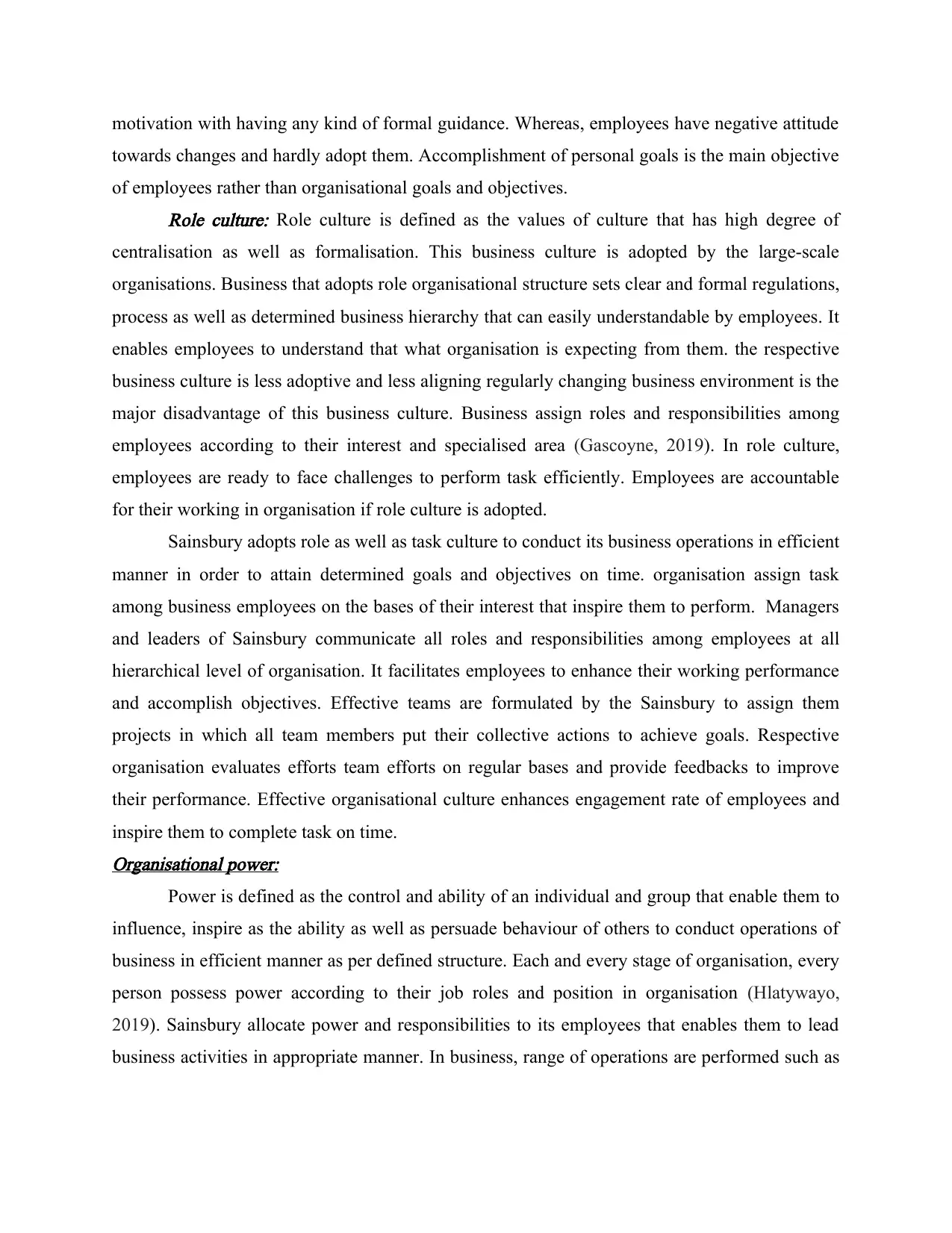
motivation with having any kind of formal guidance. Whereas, employees have negative attitude
towards changes and hardly adopt them. Accomplishment of personal goals is the main objective
of employees rather than organisational goals and objectives.
Role culture: Role culture is defined as the values of culture that has high degree of
centralisation as well as formalisation. This business culture is adopted by the large-scale
organisations. Business that adopts role organisational structure sets clear and formal regulations,
process as well as determined business hierarchy that can easily understandable by employees. It
enables employees to understand that what organisation is expecting from them. the respective
business culture is less adoptive and less aligning regularly changing business environment is the
major disadvantage of this business culture. Business assign roles and responsibilities among
employees according to their interest and specialised area (Gascoyne, 2019). In role culture,
employees are ready to face challenges to perform task efficiently. Employees are accountable
for their working in organisation if role culture is adopted.
Sainsbury adopts role as well as task culture to conduct its business operations in efficient
manner in order to attain determined goals and objectives on time. organisation assign task
among business employees on the bases of their interest that inspire them to perform. Managers
and leaders of Sainsbury communicate all roles and responsibilities among employees at all
hierarchical level of organisation. It facilitates employees to enhance their working performance
and accomplish objectives. Effective teams are formulated by the Sainsbury to assign them
projects in which all team members put their collective actions to achieve goals. Respective
organisation evaluates efforts team efforts on regular bases and provide feedbacks to improve
their performance. Effective organisational culture enhances engagement rate of employees and
inspire them to complete task on time.Organisational power:
Power is defined as the control and ability of an individual and group that enable them to
influence, inspire as the ability as well as persuade behaviour of others to conduct operations of
business in efficient manner as per defined structure. Each and every stage of organisation, every
person possess power according to their job roles and position in organisation (Hlatywayo,
2019). Sainsbury allocate power and responsibilities to its employees that enables them to lead
business activities in appropriate manner. In business, range of operations are performed such as
towards changes and hardly adopt them. Accomplishment of personal goals is the main objective
of employees rather than organisational goals and objectives.
Role culture: Role culture is defined as the values of culture that has high degree of
centralisation as well as formalisation. This business culture is adopted by the large-scale
organisations. Business that adopts role organisational structure sets clear and formal regulations,
process as well as determined business hierarchy that can easily understandable by employees. It
enables employees to understand that what organisation is expecting from them. the respective
business culture is less adoptive and less aligning regularly changing business environment is the
major disadvantage of this business culture. Business assign roles and responsibilities among
employees according to their interest and specialised area (Gascoyne, 2019). In role culture,
employees are ready to face challenges to perform task efficiently. Employees are accountable
for their working in organisation if role culture is adopted.
Sainsbury adopts role as well as task culture to conduct its business operations in efficient
manner in order to attain determined goals and objectives on time. organisation assign task
among business employees on the bases of their interest that inspire them to perform. Managers
and leaders of Sainsbury communicate all roles and responsibilities among employees at all
hierarchical level of organisation. It facilitates employees to enhance their working performance
and accomplish objectives. Effective teams are formulated by the Sainsbury to assign them
projects in which all team members put their collective actions to achieve goals. Respective
organisation evaluates efforts team efforts on regular bases and provide feedbacks to improve
their performance. Effective organisational culture enhances engagement rate of employees and
inspire them to complete task on time.Organisational power:
Power is defined as the control and ability of an individual and group that enable them to
influence, inspire as the ability as well as persuade behaviour of others to conduct operations of
business in efficient manner as per defined structure. Each and every stage of organisation, every
person possess power according to their job roles and position in organisation (Hlatywayo,
2019). Sainsbury allocate power and responsibilities to its employees that enables them to lead
business activities in appropriate manner. In business, range of operations are performed such as
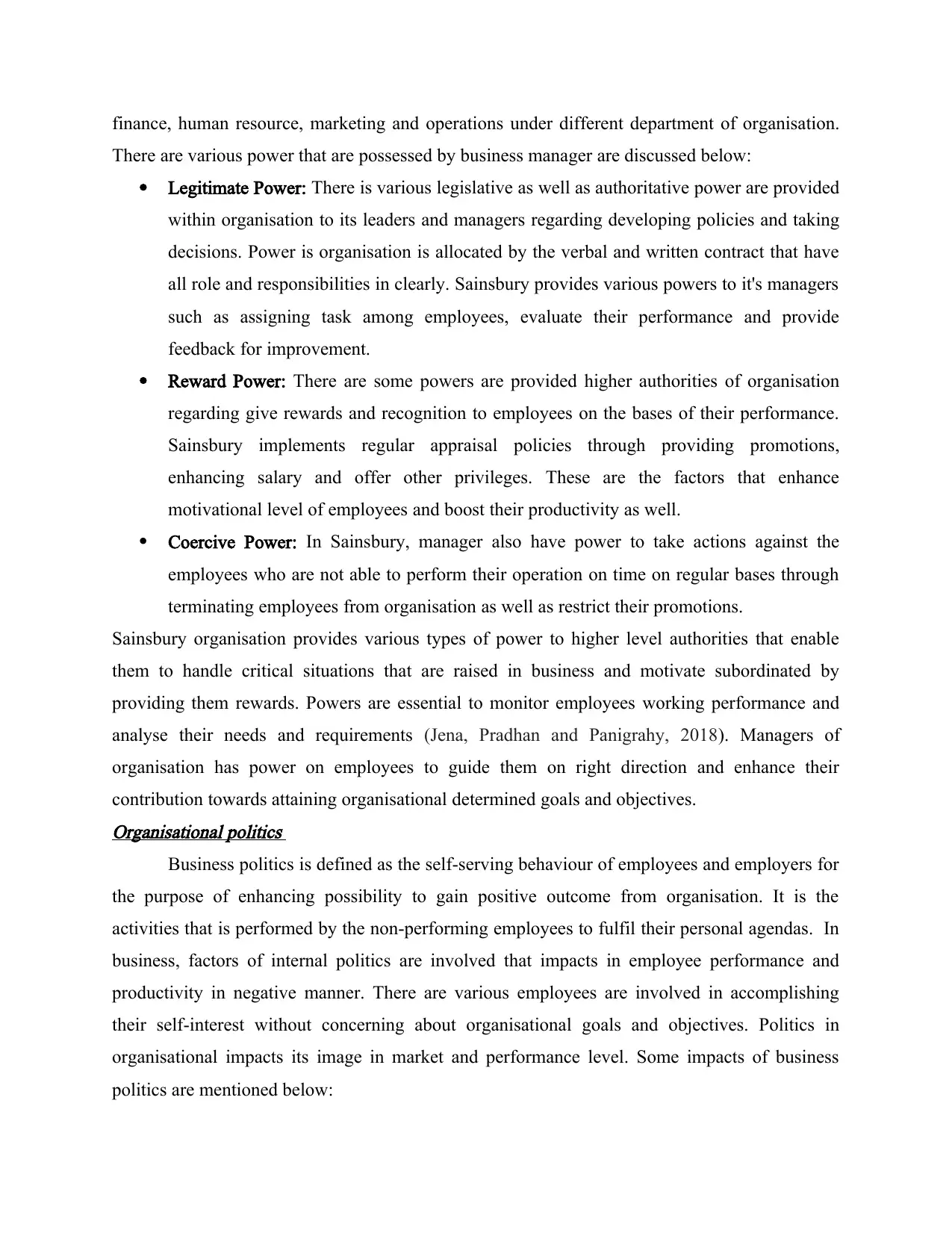
finance, human resource, marketing and operations under different department of organisation.
There are various power that are possessed by business manager are discussed below:
Legitimate Power: There is various legislative as well as authoritative power are provided
within organisation to its leaders and managers regarding developing policies and taking
decisions. Power is organisation is allocated by the verbal and written contract that have
all role and responsibilities in clearly. Sainsbury provides various powers to it's managers
such as assigning task among employees, evaluate their performance and provide
feedback for improvement.
Reward Power: There are some powers are provided higher authorities of organisation
regarding give rewards and recognition to employees on the bases of their performance.
Sainsbury implements regular appraisal policies through providing promotions,
enhancing salary and offer other privileges. These are the factors that enhance
motivational level of employees and boost their productivity as well.
Coercive Power: In Sainsbury, manager also have power to take actions against the
employees who are not able to perform their operation on time on regular bases through
terminating employees from organisation as well as restrict their promotions.
Sainsbury organisation provides various types of power to higher level authorities that enable
them to handle critical situations that are raised in business and motivate subordinated by
providing them rewards. Powers are essential to monitor employees working performance and
analyse their needs and requirements (Jena, Pradhan and Panigrahy, 2018). Managers of
organisation has power on employees to guide them on right direction and enhance their
contribution towards attaining organisational determined goals and objectives.Organisational politics
Business politics is defined as the self-serving behaviour of employees and employers for
the purpose of enhancing possibility to gain positive outcome from organisation. It is the
activities that is performed by the non-performing employees to fulfil their personal agendas. In
business, factors of internal politics are involved that impacts in employee performance and
productivity in negative manner. There are various employees are involved in accomplishing
their self-interest without concerning about organisational goals and objectives. Politics in
organisational impacts its image in market and performance level. Some impacts of business
politics are mentioned below:
There are various power that are possessed by business manager are discussed below:
Legitimate Power: There is various legislative as well as authoritative power are provided
within organisation to its leaders and managers regarding developing policies and taking
decisions. Power is organisation is allocated by the verbal and written contract that have
all role and responsibilities in clearly. Sainsbury provides various powers to it's managers
such as assigning task among employees, evaluate their performance and provide
feedback for improvement.
Reward Power: There are some powers are provided higher authorities of organisation
regarding give rewards and recognition to employees on the bases of their performance.
Sainsbury implements regular appraisal policies through providing promotions,
enhancing salary and offer other privileges. These are the factors that enhance
motivational level of employees and boost their productivity as well.
Coercive Power: In Sainsbury, manager also have power to take actions against the
employees who are not able to perform their operation on time on regular bases through
terminating employees from organisation as well as restrict their promotions.
Sainsbury organisation provides various types of power to higher level authorities that enable
them to handle critical situations that are raised in business and motivate subordinated by
providing them rewards. Powers are essential to monitor employees working performance and
analyse their needs and requirements (Jena, Pradhan and Panigrahy, 2018). Managers of
organisation has power on employees to guide them on right direction and enhance their
contribution towards attaining organisational determined goals and objectives.Organisational politics
Business politics is defined as the self-serving behaviour of employees and employers for
the purpose of enhancing possibility to gain positive outcome from organisation. It is the
activities that is performed by the non-performing employees to fulfil their personal agendas. In
business, factors of internal politics are involved that impacts in employee performance and
productivity in negative manner. There are various employees are involved in accomplishing
their self-interest without concerning about organisational goals and objectives. Politics in
organisational impacts its image in market and performance level. Some impacts of business
politics are mentioned below:
⊘ This is a preview!⊘
Do you want full access?
Subscribe today to unlock all pages.

Trusted by 1+ million students worldwide
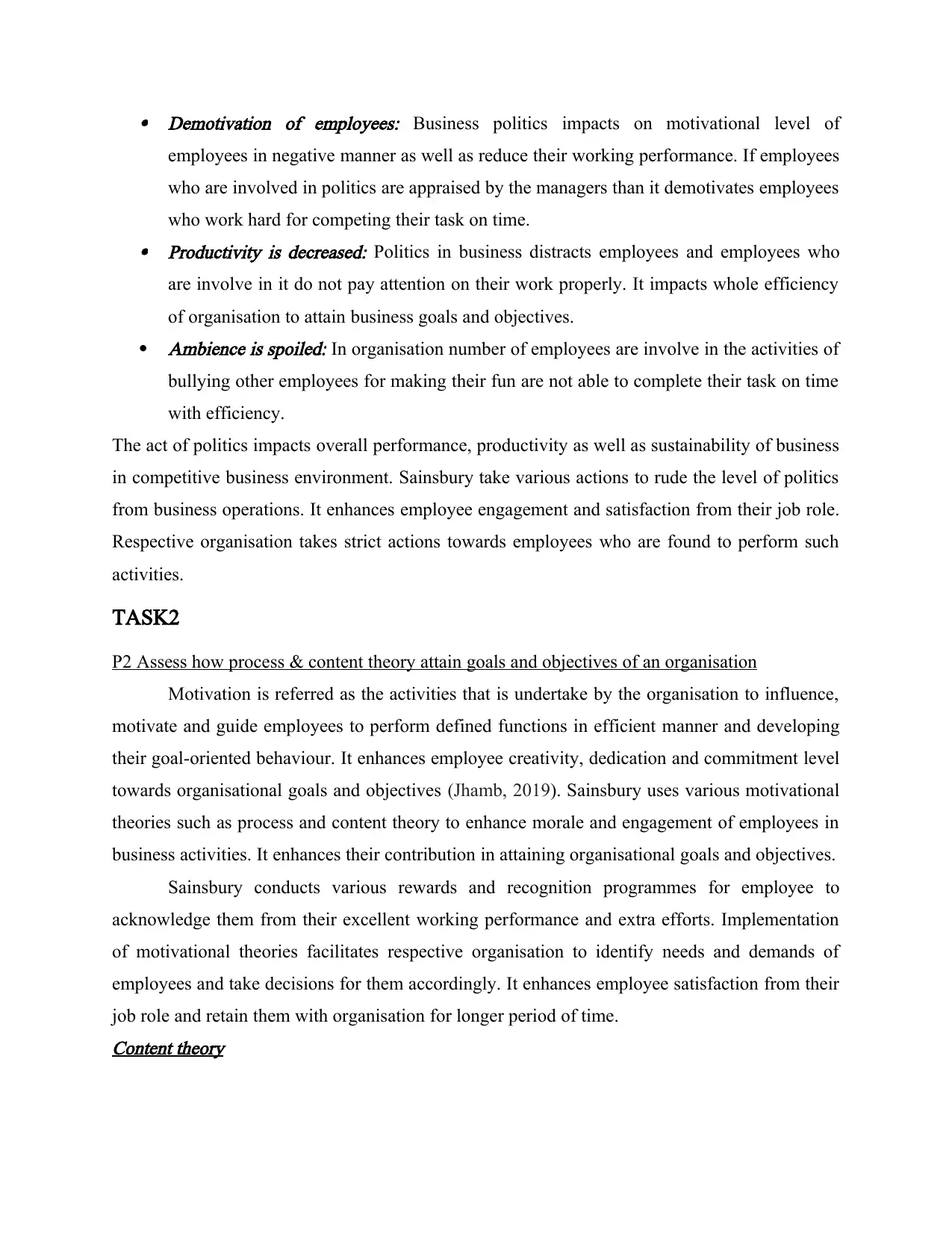
Demotivation of employees: Business politics impacts on motivational level of
employees in negative manner as well as reduce their working performance. If employees
who are involved in politics are appraised by the managers than it demotivates employees
who work hard for competing their task on time. Productivity is decreased: Politics in business distracts employees and employees who
are involve in it do not pay attention on their work properly. It impacts whole efficiency
of organisation to attain business goals and objectives.
Ambience is spoiled: In organisation number of employees are involve in the activities of
bullying other employees for making their fun are not able to complete their task on time
with efficiency.
The act of politics impacts overall performance, productivity as well as sustainability of business
in competitive business environment. Sainsbury take various actions to rude the level of politics
from business operations. It enhances employee engagement and satisfaction from their job role.
Respective organisation takes strict actions towards employees who are found to perform such
activities.
TASK2
P2 Assess how process & content theory attain goals and objectives of an organisation
Motivation is referred as the activities that is undertake by the organisation to influence,
motivate and guide employees to perform defined functions in efficient manner and developing
their goal-oriented behaviour. It enhances employee creativity, dedication and commitment level
towards organisational goals and objectives (Jhamb, 2019). Sainsbury uses various motivational
theories such as process and content theory to enhance morale and engagement of employees in
business activities. It enhances their contribution in attaining organisational goals and objectives.
Sainsbury conducts various rewards and recognition programmes for employee to
acknowledge them from their excellent working performance and extra efforts. Implementation
of motivational theories facilitates respective organisation to identify needs and demands of
employees and take decisions for them accordingly. It enhances employee satisfaction from their
job role and retain them with organisation for longer period of time.Content theory
employees in negative manner as well as reduce their working performance. If employees
who are involved in politics are appraised by the managers than it demotivates employees
who work hard for competing their task on time. Productivity is decreased: Politics in business distracts employees and employees who
are involve in it do not pay attention on their work properly. It impacts whole efficiency
of organisation to attain business goals and objectives.
Ambience is spoiled: In organisation number of employees are involve in the activities of
bullying other employees for making their fun are not able to complete their task on time
with efficiency.
The act of politics impacts overall performance, productivity as well as sustainability of business
in competitive business environment. Sainsbury take various actions to rude the level of politics
from business operations. It enhances employee engagement and satisfaction from their job role.
Respective organisation takes strict actions towards employees who are found to perform such
activities.
TASK2
P2 Assess how process & content theory attain goals and objectives of an organisation
Motivation is referred as the activities that is undertake by the organisation to influence,
motivate and guide employees to perform defined functions in efficient manner and developing
their goal-oriented behaviour. It enhances employee creativity, dedication and commitment level
towards organisational goals and objectives (Jhamb, 2019). Sainsbury uses various motivational
theories such as process and content theory to enhance morale and engagement of employees in
business activities. It enhances their contribution in attaining organisational goals and objectives.
Sainsbury conducts various rewards and recognition programmes for employee to
acknowledge them from their excellent working performance and extra efforts. Implementation
of motivational theories facilitates respective organisation to identify needs and demands of
employees and take decisions for them accordingly. It enhances employee satisfaction from their
job role and retain them with organisation for longer period of time.Content theory
Paraphrase This Document
Need a fresh take? Get an instant paraphrase of this document with our AI Paraphraser
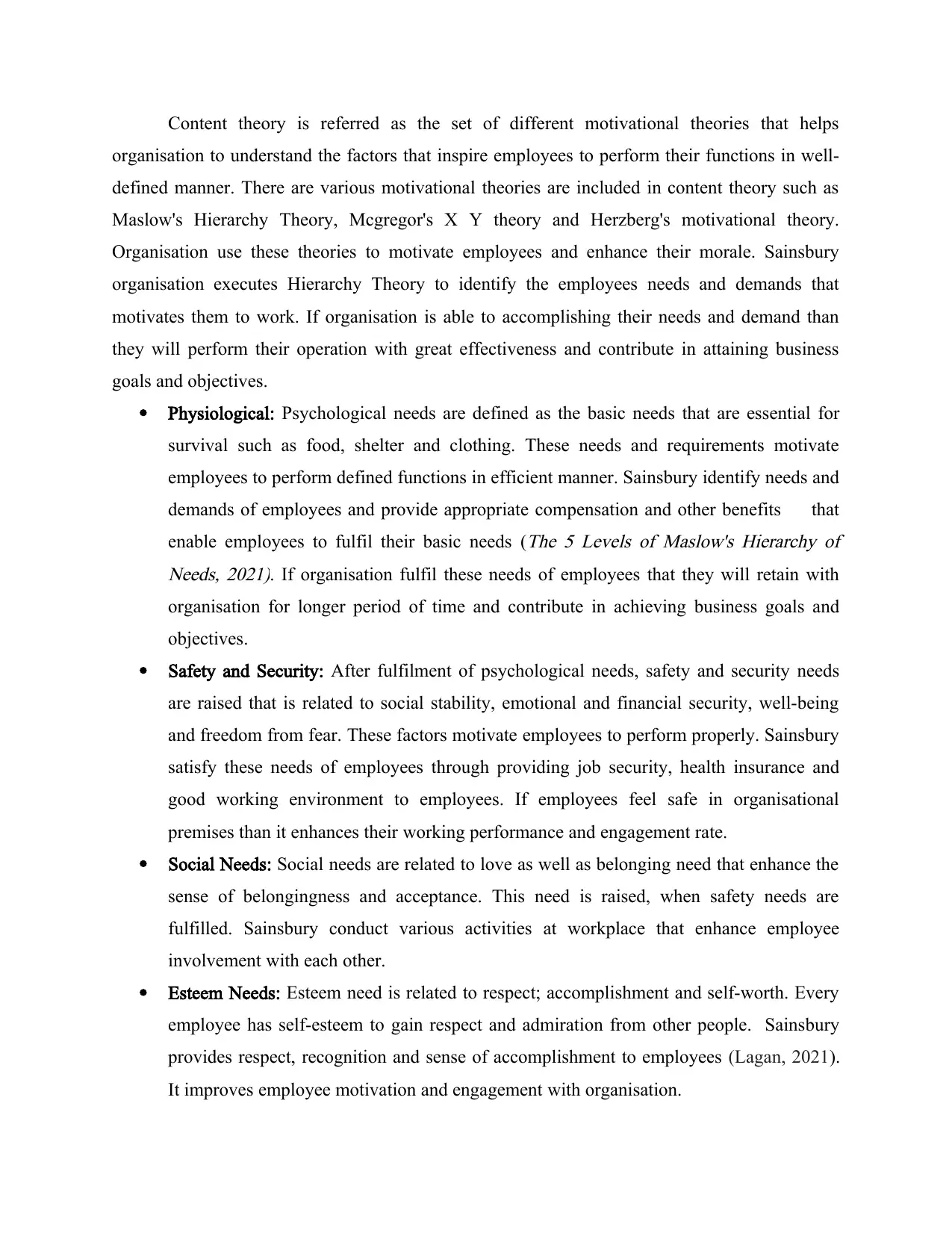
Content theory is referred as the set of different motivational theories that helps
organisation to understand the factors that inspire employees to perform their functions in well-
defined manner. There are various motivational theories are included in content theory such as
Maslow's Hierarchy Theory, Mcgregor's X Y theory and Herzberg's motivational theory.
Organisation use these theories to motivate employees and enhance their morale. Sainsbury
organisation executes Hierarchy Theory to identify the employees needs and demands that
motivates them to work. If organisation is able to accomplishing their needs and demand than
they will perform their operation with great effectiveness and contribute in attaining business
goals and objectives.
Physiological: Psychological needs are defined as the basic needs that are essential for
survival such as food, shelter and clothing. These needs and requirements motivate
employees to perform defined functions in efficient manner. Sainsbury identify needs and
demands of employees and provide appropriate compensation and other benefits that
enable employees to fulfil their basic needs (
The 5 Levels of Maslow's Hierarchy of
Needs, 2021). If organisation fulfil these needs of employees that they will retain with
organisation for longer period of time and contribute in achieving business goals and
objectives.
Safety and Security: After fulfilment of psychological needs, safety and security needs
are raised that is related to social stability, emotional and financial security, well-being
and freedom from fear. These factors motivate employees to perform properly. Sainsbury
satisfy these needs of employees through providing job security, health insurance and
good working environment to employees. If employees feel safe in organisational
premises than it enhances their working performance and engagement rate.
Social Needs: Social needs are related to love as well as belonging need that enhance the
sense of belongingness and acceptance. This need is raised, when safety needs are
fulfilled. Sainsbury conduct various activities at workplace that enhance employee
involvement with each other.
Esteem Needs: Esteem need is related to respect; accomplishment and self-worth. Every
employee has self-esteem to gain respect and admiration from other people. Sainsbury
provides respect, recognition and sense of accomplishment to employees (Lagan, 2021).
It improves employee motivation and engagement with organisation.
organisation to understand the factors that inspire employees to perform their functions in well-
defined manner. There are various motivational theories are included in content theory such as
Maslow's Hierarchy Theory, Mcgregor's X Y theory and Herzberg's motivational theory.
Organisation use these theories to motivate employees and enhance their morale. Sainsbury
organisation executes Hierarchy Theory to identify the employees needs and demands that
motivates them to work. If organisation is able to accomplishing their needs and demand than
they will perform their operation with great effectiveness and contribute in attaining business
goals and objectives.
Physiological: Psychological needs are defined as the basic needs that are essential for
survival such as food, shelter and clothing. These needs and requirements motivate
employees to perform defined functions in efficient manner. Sainsbury identify needs and
demands of employees and provide appropriate compensation and other benefits that
enable employees to fulfil their basic needs (
The 5 Levels of Maslow's Hierarchy of
Needs, 2021). If organisation fulfil these needs of employees that they will retain with
organisation for longer period of time and contribute in achieving business goals and
objectives.
Safety and Security: After fulfilment of psychological needs, safety and security needs
are raised that is related to social stability, emotional and financial security, well-being
and freedom from fear. These factors motivate employees to perform properly. Sainsbury
satisfy these needs of employees through providing job security, health insurance and
good working environment to employees. If employees feel safe in organisational
premises than it enhances their working performance and engagement rate.
Social Needs: Social needs are related to love as well as belonging need that enhance the
sense of belongingness and acceptance. This need is raised, when safety needs are
fulfilled. Sainsbury conduct various activities at workplace that enhance employee
involvement with each other.
Esteem Needs: Esteem need is related to respect; accomplishment and self-worth. Every
employee has self-esteem to gain respect and admiration from other people. Sainsbury
provides respect, recognition and sense of accomplishment to employees (Lagan, 2021).
It improves employee motivation and engagement with organisation.
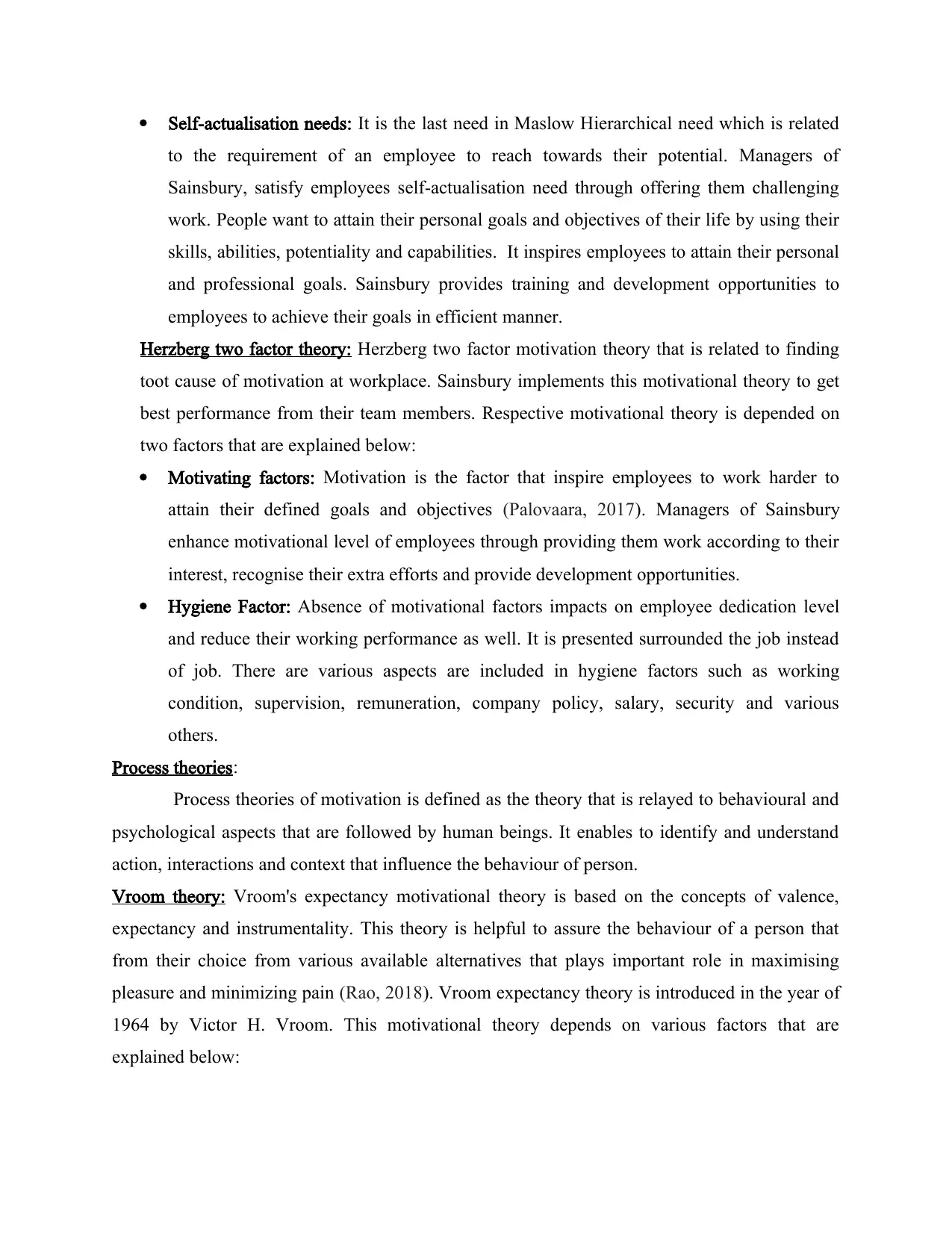
Self-actualisation needs: It is the last need in Maslow Hierarchical need which is related
to the requirement of an employee to reach towards their potential. Managers of
Sainsbury, satisfy employees self-actualisation need through offering them challenging
work. People want to attain their personal goals and objectives of their life by using their
skills, abilities, potentiality and capabilities. It inspires employees to attain their personal
and professional goals. Sainsbury provides training and development opportunities to
employees to achieve their goals in efficient manner.
Herzberg two factor theory: Herzberg two factor motivation theory that is related to finding
toot cause of motivation at workplace. Sainsbury implements this motivational theory to get
best performance from their team members. Respective motivational theory is depended on
two factors that are explained below:
Motivating factors: Motivation is the factor that inspire employees to work harder to
attain their defined goals and objectives (Palovaara, 2017). Managers of Sainsbury
enhance motivational level of employees through providing them work according to their
interest, recognise their extra efforts and provide development opportunities.
Hygiene Factor: Absence of motivational factors impacts on employee dedication level
and reduce their working performance as well. It is presented surrounded the job instead
of job. There are various aspects are included in hygiene factors such as working
condition, supervision, remuneration, company policy, salary, security and various
others.
Process theories:
Process theories of motivation is defined as the theory that is relayed to behavioural and
psychological aspects that are followed by human beings. It enables to identify and understand
action, interactions and context that influence the behaviour of person.
Vroom theory: Vroom's expectancy motivational theory is based on the concepts of valence,
expectancy and instrumentality. This theory is helpful to assure the behaviour of a person that
from their choice from various available alternatives that plays important role in maximising
pleasure and minimizing pain (Rao, 2018). Vroom expectancy theory is introduced in the year of
1964 by Victor H. Vroom. This motivational theory depends on various factors that are
explained below:
to the requirement of an employee to reach towards their potential. Managers of
Sainsbury, satisfy employees self-actualisation need through offering them challenging
work. People want to attain their personal goals and objectives of their life by using their
skills, abilities, potentiality and capabilities. It inspires employees to attain their personal
and professional goals. Sainsbury provides training and development opportunities to
employees to achieve their goals in efficient manner.
Herzberg two factor theory: Herzberg two factor motivation theory that is related to finding
toot cause of motivation at workplace. Sainsbury implements this motivational theory to get
best performance from their team members. Respective motivational theory is depended on
two factors that are explained below:
Motivating factors: Motivation is the factor that inspire employees to work harder to
attain their defined goals and objectives (Palovaara, 2017). Managers of Sainsbury
enhance motivational level of employees through providing them work according to their
interest, recognise their extra efforts and provide development opportunities.
Hygiene Factor: Absence of motivational factors impacts on employee dedication level
and reduce their working performance as well. It is presented surrounded the job instead
of job. There are various aspects are included in hygiene factors such as working
condition, supervision, remuneration, company policy, salary, security and various
others.
Process theories:
Process theories of motivation is defined as the theory that is relayed to behavioural and
psychological aspects that are followed by human beings. It enables to identify and understand
action, interactions and context that influence the behaviour of person.
Vroom theory: Vroom's expectancy motivational theory is based on the concepts of valence,
expectancy and instrumentality. This theory is helpful to assure the behaviour of a person that
from their choice from various available alternatives that plays important role in maximising
pleasure and minimizing pain (Rao, 2018). Vroom expectancy theory is introduced in the year of
1964 by Victor H. Vroom. This motivational theory depends on various factors that are
explained below:
⊘ This is a preview!⊘
Do you want full access?
Subscribe today to unlock all pages.

Trusted by 1+ million students worldwide
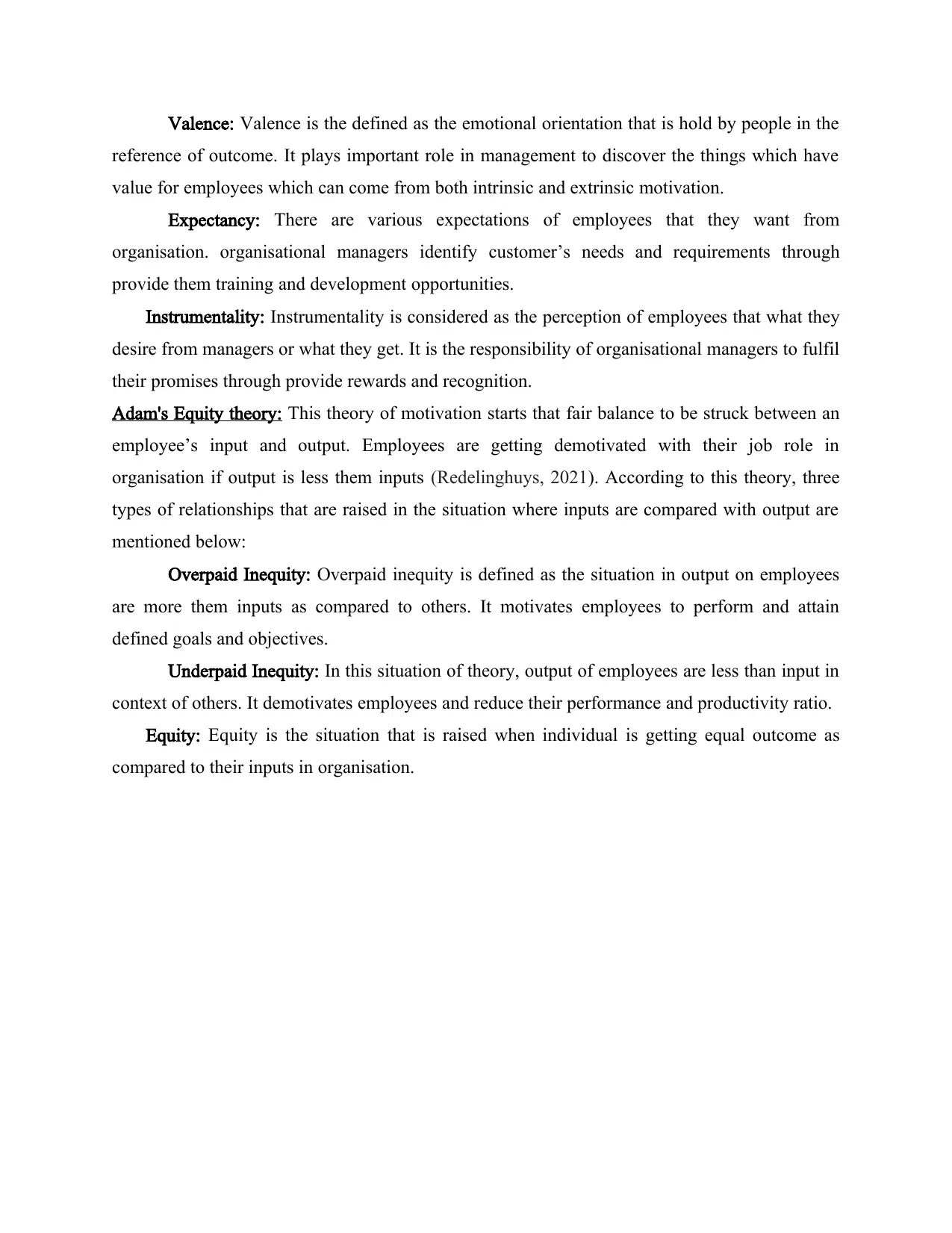
Valence: Valence is the defined as the emotional orientation that is hold by people in the
reference of outcome. It plays important role in management to discover the things which have
value for employees which can come from both intrinsic and extrinsic motivation.
Expectancy: There are various expectations of employees that they want from
organisation. organisational managers identify customer’s needs and requirements through
provide them training and development opportunities.
Instrumentality: Instrumentality is considered as the perception of employees that what they
desire from managers or what they get. It is the responsibility of organisational managers to fulfil
their promises through provide rewards and recognition.
Adam's Equity theory: This theory of motivation starts that fair balance to be struck between an
employee’s input and output. Employees are getting demotivated with their job role in
organisation if output is less them inputs (Redelinghuys, 2021). According to this theory, three
types of relationships that are raised in the situation where inputs are compared with output are
mentioned below:
Overpaid Inequity: Overpaid inequity is defined as the situation in output on employees
are more them inputs as compared to others. It motivates employees to perform and attain
defined goals and objectives.
Underpaid Inequity: In this situation of theory, output of employees are less than input in
context of others. It demotivates employees and reduce their performance and productivity ratio.
Equity: Equity is the situation that is raised when individual is getting equal outcome as
compared to their inputs in organisation.
reference of outcome. It plays important role in management to discover the things which have
value for employees which can come from both intrinsic and extrinsic motivation.
Expectancy: There are various expectations of employees that they want from
organisation. organisational managers identify customer’s needs and requirements through
provide them training and development opportunities.
Instrumentality: Instrumentality is considered as the perception of employees that what they
desire from managers or what they get. It is the responsibility of organisational managers to fulfil
their promises through provide rewards and recognition.
Adam's Equity theory: This theory of motivation starts that fair balance to be struck between an
employee’s input and output. Employees are getting demotivated with their job role in
organisation if output is less them inputs (Redelinghuys, 2021). According to this theory, three
types of relationships that are raised in the situation where inputs are compared with output are
mentioned below:
Overpaid Inequity: Overpaid inequity is defined as the situation in output on employees
are more them inputs as compared to others. It motivates employees to perform and attain
defined goals and objectives.
Underpaid Inequity: In this situation of theory, output of employees are less than input in
context of others. It demotivates employees and reduce their performance and productivity ratio.
Equity: Equity is the situation that is raised when individual is getting equal outcome as
compared to their inputs in organisation.
Paraphrase This Document
Need a fresh take? Get an instant paraphrase of this document with our AI Paraphraser
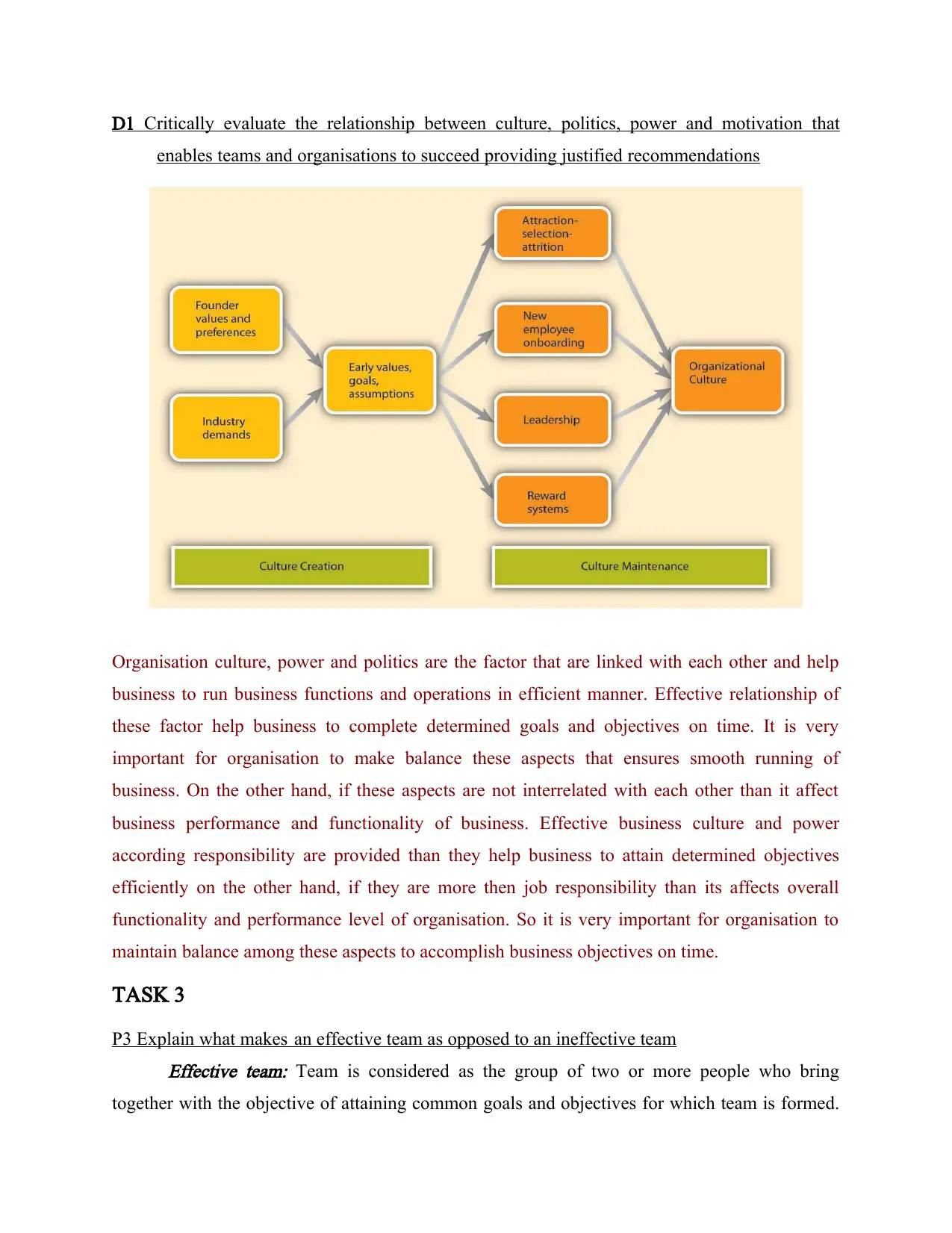
D1 Critically evaluate the relationship between culture, politics, power and motivation that
enables teams and organisations to succeed providing justified recommendations
Organisation culture, power and politics are the factor that are linked with each other and help
business to run business functions and operations in efficient manner. Effective relationship of
these factor help business to complete determined goals and objectives on time. It is very
important for organisation to make balance these aspects that ensures smooth running of
business. On the other hand, if these aspects are not interrelated with each other than it affect
business performance and functionality of business. Effective business culture and power
according responsibility are provided than they help business to attain determined objectives
efficiently on the other hand, if they are more then job responsibility than its affects overall
functionality and performance level of organisation. So it is very important for organisation to
maintain balance among these aspects to accomplish business objectives on time.
TASK 3
P3 Explain what makes an effective team as opposed to an ineffective team
Effective team: Team is considered as the group of two or more people who bring
together with the objective of attaining common goals and objectives for which team is formed.
enables teams and organisations to succeed providing justified recommendations
Organisation culture, power and politics are the factor that are linked with each other and help
business to run business functions and operations in efficient manner. Effective relationship of
these factor help business to complete determined goals and objectives on time. It is very
important for organisation to make balance these aspects that ensures smooth running of
business. On the other hand, if these aspects are not interrelated with each other than it affect
business performance and functionality of business. Effective business culture and power
according responsibility are provided than they help business to attain determined objectives
efficiently on the other hand, if they are more then job responsibility than its affects overall
functionality and performance level of organisation. So it is very important for organisation to
maintain balance among these aspects to accomplish business objectives on time.
TASK 3
P3 Explain what makes an effective team as opposed to an ineffective team
Effective team: Team is considered as the group of two or more people who bring
together with the objective of attaining common goals and objectives for which team is formed.
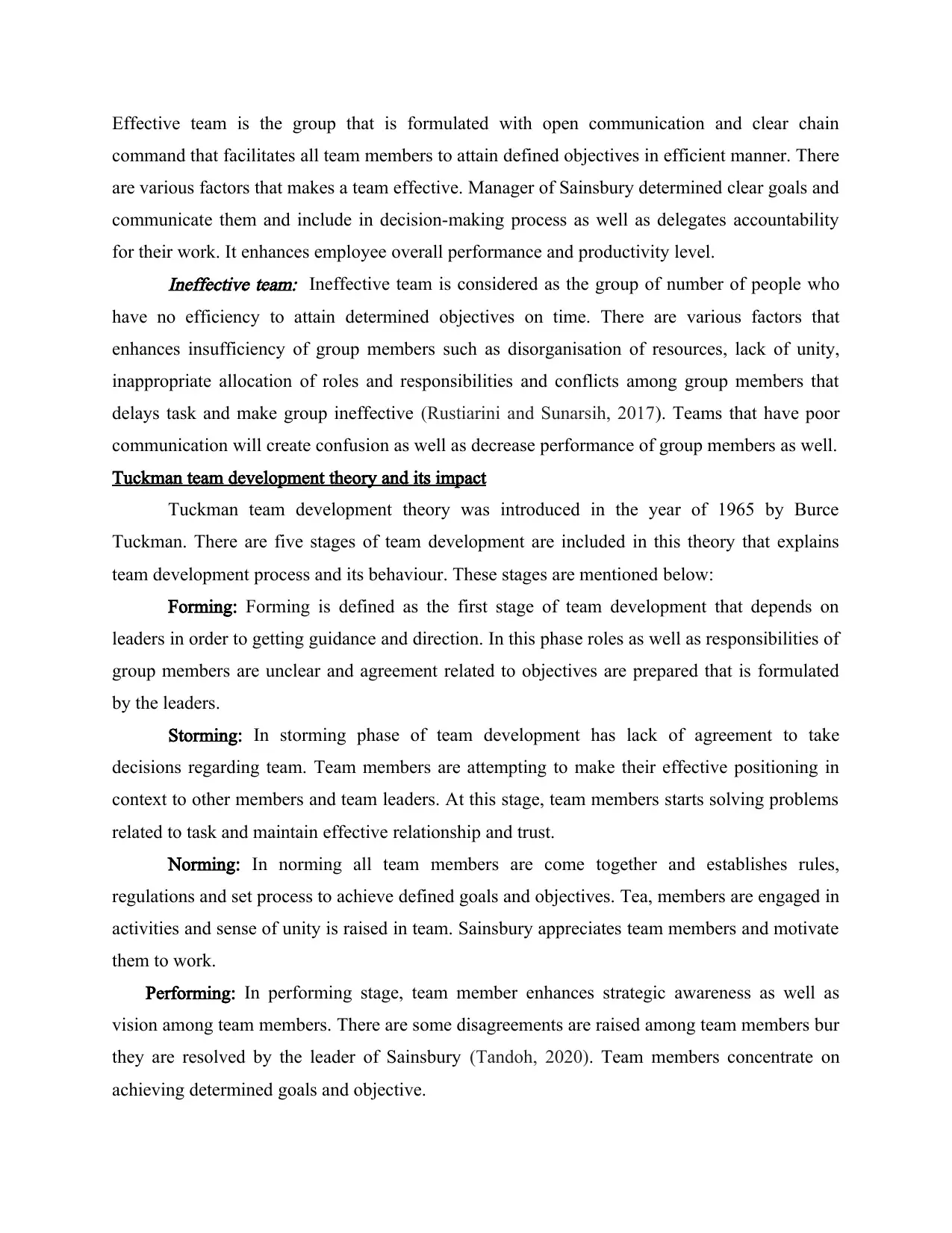
Effective team is the group that is formulated with open communication and clear chain
command that facilitates all team members to attain defined objectives in efficient manner. There
are various factors that makes a team effective. Manager of Sainsbury determined clear goals and
communicate them and include in decision-making process as well as delegates accountability
for their work. It enhances employee overall performance and productivity level.
Ineffective team: Ineffective team is considered as the group of number of people who
have no efficiency to attain determined objectives on time. There are various factors that
enhances insufficiency of group members such as disorganisation of resources, lack of unity,
inappropriate allocation of roles and responsibilities and conflicts among group members that
delays task and make group ineffective (Rustiarini and Sunarsih, 2017). Teams that have poor
communication will create confusion as well as decrease performance of group members as well.
Tuckman team development theory and its impact
Tuckman team development theory was introduced in the year of 1965 by Burce
Tuckman. There are five stages of team development are included in this theory that explains
team development process and its behaviour. These stages are mentioned below:
Forming: Forming is defined as the first stage of team development that depends on
leaders in order to getting guidance and direction. In this phase roles as well as responsibilities of
group members are unclear and agreement related to objectives are prepared that is formulated
by the leaders.
Storming: In storming phase of team development has lack of agreement to take
decisions regarding team. Team members are attempting to make their effective positioning in
context to other members and team leaders. At this stage, team members starts solving problems
related to task and maintain effective relationship and trust.
Norming: In norming all team members are come together and establishes rules,
regulations and set process to achieve defined goals and objectives. Tea, members are engaged in
activities and sense of unity is raised in team. Sainsbury appreciates team members and motivate
them to work.
Performing: In performing stage, team member enhances strategic awareness as well as
vision among team members. There are some disagreements are raised among team members bur
they are resolved by the leader of Sainsbury (Tandoh, 2020). Team members concentrate on
achieving determined goals and objective.
command that facilitates all team members to attain defined objectives in efficient manner. There
are various factors that makes a team effective. Manager of Sainsbury determined clear goals and
communicate them and include in decision-making process as well as delegates accountability
for their work. It enhances employee overall performance and productivity level.
Ineffective team: Ineffective team is considered as the group of number of people who
have no efficiency to attain determined objectives on time. There are various factors that
enhances insufficiency of group members such as disorganisation of resources, lack of unity,
inappropriate allocation of roles and responsibilities and conflicts among group members that
delays task and make group ineffective (Rustiarini and Sunarsih, 2017). Teams that have poor
communication will create confusion as well as decrease performance of group members as well.
Tuckman team development theory and its impact
Tuckman team development theory was introduced in the year of 1965 by Burce
Tuckman. There are five stages of team development are included in this theory that explains
team development process and its behaviour. These stages are mentioned below:
Forming: Forming is defined as the first stage of team development that depends on
leaders in order to getting guidance and direction. In this phase roles as well as responsibilities of
group members are unclear and agreement related to objectives are prepared that is formulated
by the leaders.
Storming: In storming phase of team development has lack of agreement to take
decisions regarding team. Team members are attempting to make their effective positioning in
context to other members and team leaders. At this stage, team members starts solving problems
related to task and maintain effective relationship and trust.
Norming: In norming all team members are come together and establishes rules,
regulations and set process to achieve defined goals and objectives. Tea, members are engaged in
activities and sense of unity is raised in team. Sainsbury appreciates team members and motivate
them to work.
Performing: In performing stage, team member enhances strategic awareness as well as
vision among team members. There are some disagreements are raised among team members bur
they are resolved by the leader of Sainsbury (Tandoh, 2020). Team members concentrate on
achieving determined goals and objective.
⊘ This is a preview!⊘
Do you want full access?
Subscribe today to unlock all pages.

Trusted by 1+ million students worldwide
1 out of 19
Related Documents
Your All-in-One AI-Powered Toolkit for Academic Success.
+13062052269
info@desklib.com
Available 24*7 on WhatsApp / Email
![[object Object]](/_next/static/media/star-bottom.7253800d.svg)
Unlock your academic potential
Copyright © 2020–2026 A2Z Services. All Rights Reserved. Developed and managed by ZUCOL.



